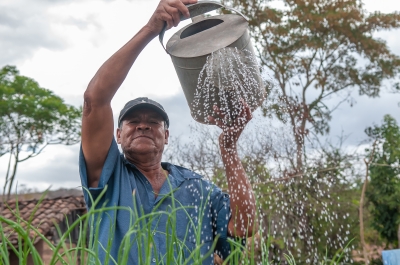Towards more secure land tenure rights

Individual or collective land titling obtained under Nicaragua’s Land Administration Project, known as PRODEP, contributed significantly to a greater perception among beneficiaries of increased land tenure security and land value. These were among the findings of an impact evaluation carried out by FAO and partners on the second phase of the project. The project is now considered a transformative land tenure programme, with a third phase having begun in 2018.
Spanning more than two decades, PRODEP has promoted individual and collective land tenure rights for smallholders, greater access among women to land titles, and collective rights managed by indigenous communities or rural villages. The programme has benefitted from sustained investments from the Government and financing partners, particularly the World Bank, and implementation support from the Centre for more than ten years. The Centre’s multidisciplinary team has provided technical assistance to strengthen different land administration institutions at country level, including municipalities and indigenous communities, and to develop monitoring and evaluation systems for the programme. The PRODEP team also conducted systematic land surveys and tenure regularization, using geospatial technologies to develop modern land information systems. These data, along with other national territorial information systems, are contributing to the development of a national spatial data infrastructure in Nicaragua.
With support from FAO’s K4I programme, the Centre teamed up with colleagues from FAO’s Agrifood Economics Division, as well as World Bank and PRODEP/Nicaragua partners, to carry out the impact evaluation in 2020 and 2021. The team measured the impacts of land titles on tenure security, property value, access to credit and household investments. They found that the perception of increased property values was higher among women land title owners who had benefitted from PRODEP’s second phase. The evaluation team also looked at how the geospatial land information system is affecting aspects such as tenure security, land transactions, access to data and decentralization of land administration services.
While results from the programme, in line with the VGGT, were encouraging, the evaluation team pointed to the importance of strengthening linkages with complementary programmes on local economic development, housing and poverty reduction for greater impact in the country.
